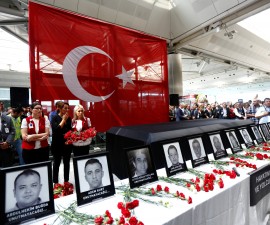JUDY WOODRUFF: We return now to Istanbul and the aftermath of Tuesday's deadly airport attack. More of the dead were memorialized today, and larger questions are being asked about how Turkey will respond.
From Istanbul, special correspondent Jane Ferguson reports.
JANE FERGUSON, Special Correspondent: Shattered families have gathered to bury their loved ones in funerals across Istanbul. Many of those killed on Tuesday's attack at Ataturk Airport were Turkish nationals, leaving behind grieving relatives and a shocked country.
At this small high school in the city, people gathered to say goodbye to 28-year-old teacher Hussayn Tunch. He was waiting for a friend to arrive when the attackers struck. His students are clearly shaken.
CERAM HAMI, Student (through translator): We first heard the news from social media and couldn't believe it. Then we checked the school Web site and found out it was our teacher.

JANE FERGUSON: Police say the attack was planned here, a historic neighborhood in Istanbul called Fatih. The three suicide bombers lived in this second-floor apartment before that attack. Turkish news media here report that neighbors complained of a suspicious chemical odor coming from the building. The Turkish government says the three men were from Russia and the central Asian countries of Kyrgyzstan and Uzbekistan, and that it was an ISIS attack.
Reactions to Tuesday's attack reflect how polarized Turkey's population is. Some locals in Istanbul told the "NewsHour" they don't think the government is doing everything it can to keep them safe.
MANSUR AKCAY, Istanbul Resident (through translator): I don't think they do enough. With this last attack, there is not much they can do. They tried, but they made it worse. They cannot control it.
JANE FERGUSON: Others are staunch defenders of the government.
MAN (through translator): The opposition, they don't know anything. They just talk.
JANE FERGUSON: Turkey's president, Recep Tayyip Erdogan, has been criticized in the past for tolerating the Islamic State's use of the country as a backdoor into Syria. ISIS recruits have often traveled through Turkey on their way to join the group. It's an issue that's led to backlash in the streets.
BERIVAN TANRIVERDI, Protestor (through translator): We think we are surviving by chance, because the government supports ISIS, and innocent people are killed as a result. We are here for the innocent people who were killed yesterday at the Ataturk Airport.
JANE FERGUSON: Now the government is under renewed pressure to react to the attacks, in part by thawing relations with Russia. Erdogan has called for Syria's President Bashar al-Assad to step down, and had been angered by Russia's support of the dictator.
Last year, Turkish jets downed a Russian plane accused of entering their airspace from Syria. But Turkish analysts say Ankara increasingly sees Russia as an important partner, not only in the fight against ISIS.
BORA BAYRAKTAR, Istanbul Kultur University: Russia provides balance for Turkey. Turkey always needed a power to balance European and American demands.
JANE FERGUSON: Those swings in alliances continue, as Syria's war tests country after country, and its front-line state Turkey faces some of the most daunting challenges of all.
For the "PBS NewsHour," I'm Jane Ferguson in Istanbul, Turkey.












